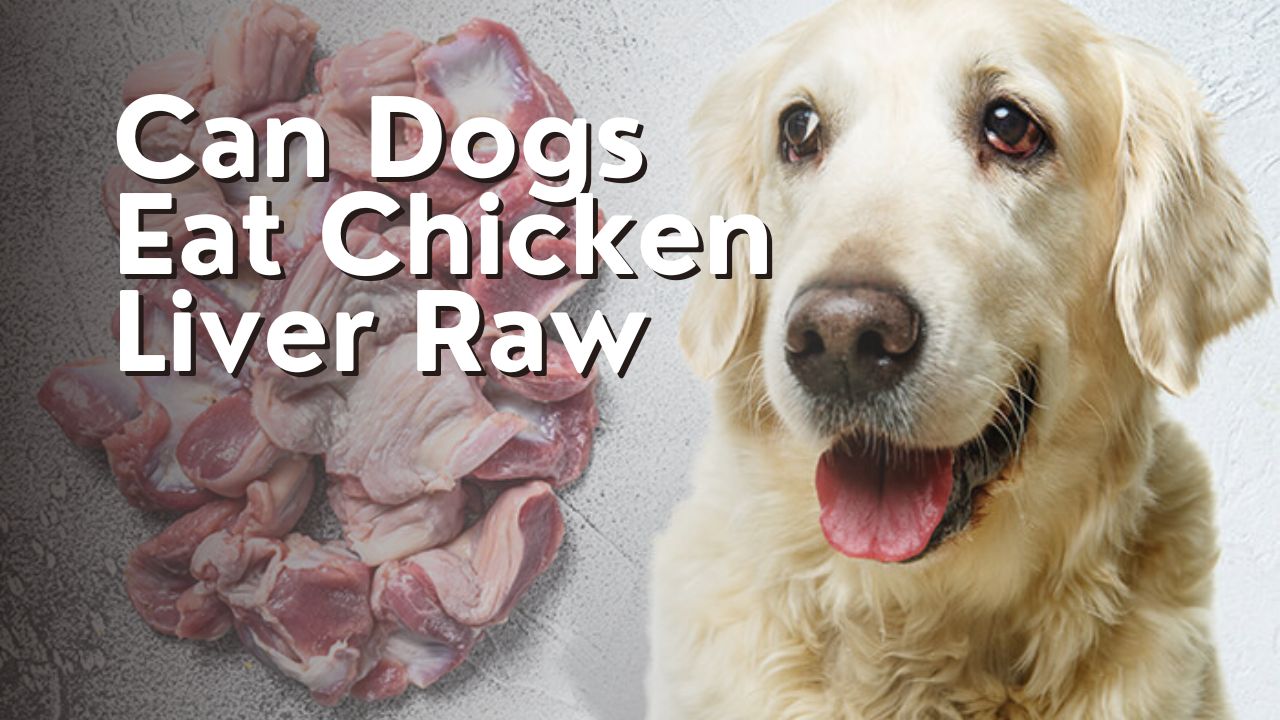Hey fellow dog lovers! Today, I want to tackle a question that has been on my mind lately: can dogs eat chicken liver raw? As a proud dog owner myself, I’m always looking for ways to provide the best nutrition for my furry friend. And chicken liver seems to be a popular choice among pet parents. But is it safe to feed it to our dogs in its raw form?
In this article, I will explore the nutritional benefits of chicken liver for dogs, as well as the potential risks associated with feeding it raw. I’ll also share some precautions you can take if you choose to feed raw chicken liver to your canine companion. And if you’re not comfortable with the idea of raw liver, don’t worry! I’ll provide some alternative options that are just as nutritious.
Remember, it’s always important to consult with a veterinarian for personalized advice regarding your dog’s diet. So, let’s dive in and find out if raw chicken liver is a healthy choice for our beloved pups!
- The Nutritional Benefits of Chicken Liver for Dogs
- The Potential Risks of Feeding Raw Chicken Liver to Dogs
- Precautions to Take When Feeding Raw Chicken Liver to Dogs
- Alternatives to Raw Chicken Liver for Dogs
- Consulting with a Veterinarian for Individualized Advice
- Frequently Asked Questions
- Conclusion
The Nutritional Benefits of Chicken Liver for Dogs
Feeding your furry friend raw chicken liver can provide them with a plethora of nutritional benefits! As a dog owner, I am always looking for ways to improve my pup’s diet and overall health.
Chicken liver is an excellent choice because it is packed with essential nutrients that can support their well-being.
First and foremost, chicken liver is a fantastic source of protein. Protein is crucial for dogs as it helps build and repair tissues, muscles, and organs. It also plays a vital role in supporting a healthy immune system. By adding raw chicken liver to my dog’s diet, I know I am giving them a protein-rich meal that will help keep them strong and healthy.
In addition to protein, chicken liver is also a great source of vitamins and minerals. It contains high levels of vitamin A, which is essential for healthy vision, immune function, and cell growth. It is also rich in B vitamins, which play a crucial role in energy production and metabolism. These vitamins are essential for dogs’ overall health and can help keep their coat shiny and their skin healthy.
Furthermore, chicken liver is a natural source of iron and zinc. Iron is necessary for the production of red blood cells, which carry oxygen throughout the body. Zinc, on the other hand, supports immune function, aids in wound healing, and promotes a healthy coat and skin.
Overall, incorporating raw chicken liver into my dog’s diet has been a game-changer. It provides them with a wide range of essential nutrients that support their overall health and well-being.
Just remember to always consult with your veterinarian before making any changes to your dog’s diet.

The Potential Risks of Feeding Raw Chicken Liver to Dogs
Feeding raw chicken liver to dogs can pose potential risks. One of these risks is bacterial contamination. Raw chicken liver may contain harmful bacteria, such as Salmonella and Campylobacter. These bacteria can cause severe gastrointestinal issues in dogs. Additionally, there is a risk of foodborne illness. If dogs consume raw chicken liver contaminated with these bacteria, they can become ill. It’s important for dog owners to be aware of these risks and take necessary precautions. Furthermore, it’s worth noting that these bacteria can also be transmitted to humans through contact with the dog’s feces. Therefore, proper hygiene practices should be followed when handling and disposing of dog waste.
Bacterial Contamination
Although it’s tempting to give your furry friend raw chicken liver, it’s important to be aware of the potential bacterial contamination it may pose.
Raw chicken liver can be contaminated with harmful bacteria such as Salmonella and Campylobacter. These bacteria can cause serious illnesses in dogs, including diarrhea, vomiting, and even life-threatening infections.
Dogs are not immune to these bacteria, and their digestive systems may not be able to handle the pathogens present in raw meat. Cooking chicken liver thoroughly can help kill these bacteria and make it safer for your dog to consume.
It’s always better to err on the side of caution and prioritize your dog’s health by cooking the chicken liver before feeding it to them.
Risk of Foodborne Illness
Consuming improperly prepared food can lead to serious cases of foodborne illness. When it comes to feeding dogs raw chicken liver, there is a risk of bacterial contamination that can cause illness in both dogs and humans. It is important to consider the following points:
- Salmonella: Raw chicken liver may contain salmonella bacteria, which can cause symptoms like vomiting, diarrhea, and fever in dogs. It can also be transmitted to humans through contact with the dog’s feces.
- Campylobacter: Another common bacteria found in raw chicken liver is Campylobacter. This bacteria can cause gastrointestinal issues in both dogs and humans, including abdominal pain and bloody diarrhea.
- E. coli: Raw chicken liver can also be contaminated with E. coli, a bacteria that can cause severe illness, especially in young children and elderly individuals.
- Cross-contamination: Handling raw chicken liver can also lead to cross-contamination of other surfaces and foods, increasing the risk of foodborne illness.
To ensure the safety of both your dog and yourself, it is best to cook chicken liver thoroughly before feeding it to your dog.
Precautions to Take When Feeding Raw Chicken Liver to Dogs
Make sure to handle raw chicken liver with care to ensure your furry friend’s safety and enjoyment. Dogs can eat chicken liver raw, but it’s important to take precautions to minimize the risk of foodborne illness.
First, purchase fresh, high-quality chicken liver from a reputable source. Look for liver that is bright red in color and has a fresh smell.
When handling the liver, wash your hands thoroughly before and after, and clean any surfaces or utensils that come into contact with it.
Store the liver properly in the refrigerator and use it within a few days to prevent bacterial growth.
Consider cutting the liver into small, bite-sized pieces to make it easier for your dog to chew and digest.
Always supervise your dog while they are eating to prevent any choking hazards.
By following these precautions, you can ensure that your dog can safely enjoy the benefits of raw chicken liver in their diet.
Alternatives to Raw Chicken Liver for Dogs
Cooked chicken liver can be a safer alternative to feeding raw chicken liver to dogs. By cooking the liver, it helps to eliminate any potential bacteria or parasites that may be present.
Additionally, there are other nutritious organ meats that can be fed to dogs, such as beef liver or lamb kidneys, which provide similar benefits to chicken liver.
Cooked Chicken Liver as a Safer Option
If you’re looking for a safer option, consider giving your furry friend some cooked chicken liver. Cooking the liver can help eliminate any potential bacteria or parasites that may be present in raw liver. It also helps to make the liver more palatable for your dog, as the cooking process can enhance the flavor and texture. However, it’s important to note that you should avoid using any seasonings or additives when cooking the liver for your dog, as these can be harmful to their health.
When cooking chicken liver for your dog, it’s best to boil or steam it until it is fully cooked. Avoid frying or grilling the liver, as these methods may add unnecessary fats and oils that can be harmful to your dog’s health. Additionally, make sure to let the liver cool completely before serving it to your furry friend, as hot food can cause burns or discomfort. Remember, moderation is key when it comes to feeding your dog liver, so it’s best to consult with your veterinarian for specific feeding guidelines.
Here is a comparison table to highlight the differences between raw and cooked chicken liver for dogs:
| Raw Chicken Liver | Cooked Chicken Liver | |
|---|---|---|
| Texture | Soft, raw texture | Firmer, cooked texture |
| Flavor | Natural, raw flavor | Enhanced, cooked flavor |
| Safety | Potential risk of bacteria or parasites | Reduced risk of bacteria or parasites |
| Palatability | May not be as appealing to some dogs | More appealing to most dogs |
| Nutrient Retention | High nutrient retention | Slight nutrient loss due to cooking |
Overall, cooked chicken liver can be a safer alternative to raw liver for dogs, as long as it is prepared properly and fed in moderation.
Other Nutritious Organ Meats for Dogs
Cooked chicken liver may be a safer option for dogs, but there are other nutritious organ meats that can also benefit our furry friends. As a dog owner, I have explored various options to provide a balanced diet for my pup.
Along with chicken liver, I have discovered the goodness of other organ meats that can be fed raw or cooked. The first sub-list includes beef liver, which is rich in vitamin A and iron, promoting healthy vision and blood circulation.
The second sub-list consists of lamb kidney, which is packed with essential nutrients like zinc and vitamin B12, supporting a strong immune system and optimal brain function.
Incorporating these organ meats into my dog’s diet has not only provided him with a wide range of nutrients but also enhanced his overall well-being, making him a happy and healthy companion.

Consulting with a Veterinarian for Individualized Advice
When consulting with a vet, you can get personalized advice on whether your furry friend can enjoy some raw chicken liver. It’s important to remember that every dog is unique and may have different dietary needs or sensitivities. A veterinarian can evaluate your dog’s overall health and provide recommendations based on their individual needs.
While chicken liver is a nutritious organ meat that can be beneficial for dogs, it’s crucial to consult with a vet before introducing it into their diet, especially in its raw form. Raw chicken liver may contain bacteria such as Salmonella or Campylobacter, which can pose a risk to both dogs and humans. Cooking the chicken liver thoroughly can help eliminate these potential health hazards.
Additionally, a vet can assess your dog’s current diet and determine if adding chicken liver, whether raw or cooked, is suitable. They can also advise on the appropriate portion size and frequency of feeding. Too much organ meat, including chicken liver, can lead to an imbalance in nutrients, so it’s crucial to follow your vet’s guidance.
Ultimately, consulting with a veterinarian is the best way to ensure your dog’s dietary needs are met safely and effectively. They can provide personalized advice based on your dog’s specific circumstances and help you make informed decisions about their nutrition.
Frequently Asked Questions
What are the other nutritional benefits of chicken liver for dogs, aside from the ones mentioned in the article?
Aside from the benefits mentioned in the article, chicken liver is also rich in vitamins A, B12, and iron, which can help support a dog’s immune system, promote healthy blood cells, and maintain energy levels.
Can dogs get sick from eating raw chicken liver?
Dogs can get sick from eating raw chicken liver because it may contain harmful bacteria like salmonella. It’s important to cook chicken liver thoroughly to ensure it is safe for consumption.
How often should I feed my dog raw chicken liver?
I recommend feeding my dog raw chicken liver once or twice a week. It is important to provide a balanced diet, so I also include other protein sources and consult with a veterinarian for specific feeding guidelines.
Are there any specific dog breeds that should not be fed raw chicken liver?
There are no specific dog breeds that should not be fed raw chicken liver. However, it is important to consult with a veterinarian before introducing any new food to your dog’s diet.
What are the signs or symptoms that my dog may be having an adverse reaction to raw chicken liver?
If my dog is having an adverse reaction to raw chicken liver, signs may include vomiting, diarrhea, abdominal pain, lethargy, and loss of appetite. It’s important to monitor them closely and seek veterinary care if needed.
Conclusion
In conclusion, while chicken liver can provide many nutritional benefits for dogs, it is important to exercise caution when considering feeding it to them raw. There are potential risks associated with raw chicken liver, such as bacterial contamination.
Taking precautions, such as properly handling and preparing the liver, can help reduce these risks. However, there are also alternative options available for providing the same nutritional benefits to your dog.
It is always best to consult with a veterinarian for personalized advice on what is best for your furry friend.


